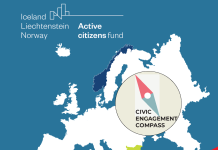Volunteers, as well as people who work and are members of non-governmental organizations, support democratic values, Bulgaria’s Western orientation, environmental protection and gender equality to a greater extent than other citizens. This is stated in a report by the Open Society Institute – Sofia on the dynamics of the non-governmental sector in Bulgaria in 2023.
According to the report, approximately 1.2 million people have membership in NGOs, i.e. it can be assumed that practically every fifth adult Bulgarian citizen is a member of some organized form of civic association. Approximately the same share of citizens express confidence in NGOs and report that they have participated in volunteering activities in the last year. According to data from a nationally representative public opinion survey conducted in July 2023, cited in the report, two out of every five Bulgarian citizens (41%) say that they would volunteer for an organization, activity or cause for which they feel empathetic. Those who say they would not do voluntary work are 36%, and nearly 80% say they are not members of any public organizations.
The survey shows that people who are willing to volunteer more often than those who are not willing to agree that democracy is the best form of government for Bulgaria (71% vs. 57%) and express support for an alliance with NATO and the EU over an alliance with Russia against the backdrop of the war in Ukraine (51% vs. 39%).
Despite the diverse nature of the NGOs operating in the country and the differences in the values they stand for, in general, people who are members of such organizations tend to prioritize environmental protection over economic growth to a greater extent than other citizens (56% vs. 43% for others) and share the opinion that men and women should have equal chances in hiring (62% vs. 44% for others). NGO representatives are also more in favor of preserving civil liberties – 67% of them would not agree with a restriction of democratic rights and freedoms even for a short period, while only 41% of adult citizens of the country as a whole express such disagreement.
At the end of 2023, approximately 26,000 non-profit legal entities were officially registered in Bulgaria, but according to NSI data, only 9170 of them had annual revenues or expenses exceeding BGN 500 for 2021. Organisations meeting this criterion can be defined as working NGOs. The concentration of working NGOs in Sofia is almost twice as high as the national average. In Sofia, there are 22 working NGOs per 10,000 people, while on average they are slightly over 13 per 10,000 people in the country. Approximately one third of the working NGOs are community centers. According to data from the Register of Community Centers, as of October 2023, approximately 80% of the community centers operate in villages.
The report “Dynamics of the Non-Governmental Sector in Bulgaria in 2023” provides an overview of the development of active civil society organizations in the country, comparing their state in 2023 with that of 2017, when a similar study was conducted. The report defines as “active NGOs” a little over 1500 organizations that during the period under review have sought funding for their activities from donor programs such as the Active Citizens Fund (www.activecitizensfund.bg) under the EEA FM and/or have an updated profile in the Information Portal for Non-Governmental Organizations in Bulgaria (www.ngobg.info).
Within the observed period (2017 – 2023), the assessment of active NGOs on the state of the legal framework for the functioning of the civil sector in Bulgaria deteriorated. In 2023, more than half (51%) of the surveyed active NGOs define the legal framework as restrictive and rather restrictive. For comparison, in 2017, in a similar survey, 42% of respondents shared a similar opinion.
The assessment of the influence of extremist groups in the country is also deteriorating. By 10 percentage points – from 24% in 2017 to 34% in 2023, the share of active NGOs also increased, according to which the influence of racist, discriminatory or intolerant groups in Bulgaria is significant. At the same time, 58% of active NGOs believe that the most vulnerable groups in society fail to sufficiently defend their interests and needs.
The lack of financial and material resources, insufficient state support for the sector and the lack of professionals with the necessary expertise are the three most frequently mentioned problems facing the activities of active NGOs, with the lack of human resources being the most acute problem in the last 6 years. Compared to a similar survey conducted in 2017, the lack of financial resources (indicated by 59% of the surveyed NGOs in 2023 compared to 65% in 2017) and insufficient state support for civil society organizations (indicated by around 41% in 2023 compared to 49% in 2017) remain in the first two places among the most frequently mentioned problems, albeit with a decreasing share of respondents who indicate them. However, the problem of human resource shortages has risen from 6th to 3rd position (indicated by about 38% of the surveyed NGOs in 2023, compared to 29% in 2017). At the same time, a serious decline was observed in the reference to the problem of political influence of parties on the financing of NGOs (from 33% to 19%), the redirection of a large part of EU funds from support for NGOs to public administration (from 42% to 33%) and the withdrawal of donors (from 27% to 14%).
Among the sources of legitimacy of NGOs, the leading positions in the opinion of the respondents are expert knowledge, advocacy for rights and policies, dialogue with citizens and representation of the interests of social groups.
The leading areas of activity of active NGOs remain unchanged in 2023: education (39%), social services and healthcare (27%) and regional, local and community development (25%). NGO representatives identify education, work with children and young people, volunteering, human rights protection, anti-discrimination and the provision of social services as areas in which NGOs have the greatest influence.
The expertise that the largest share of civil society organizations say they need, but which is lacking, is primarily related to fundraising, in the field of law, public relations and work with Internet technologies. Compared to 2017, the most significant jump was observed in the share of organizations that stated that they needed additional expertise in the field of Internet technologies (an increase from 24% to 31%).
The share of NGOs that say that the development of civil society organizations in Bulgaria depends on global political processes has significantly increased to over 76% in 2023 from 66% in 2017. At the same time, the assessment of the positive role of the EU on the state of civil society in Bulgaria is being strengthened – in 2023, more than 75% of the surveyed NGO representatives give a positive assessment of the role of the Union, and compared to 2017, the fully positive assessments increase significantly by about 10 percentage points.
Among the main sources of funding that help build resilience and capacity of NGOs, the EU programs managed by the European Commission, the Active Citizens Fund – Bulgaria under the EEA FM and the operational programs are named at the top of more than half of the respondents. Only about 10% believe that the state plays an important role in the financing of NGOs. It should be noted that many of the respondents do not seem to perceive operational programs as part of state funding. The surveyed NGOs express a preference for the grants provided by donors to cover 100% of the activities of the supported projects, without requiring co-financing, as well as the support to be directed to long-term projects of more than 18 months.
Every third active non-governmental organization reports that it works with an annual budget of less than BGN 20,000, and organizations operating with more than one million BGN per year are less than 6%. Against the backdrop of high inflation registered over the past three years, just over 20% of the surveyed organizations say that their revenues have decreased during this period, about 24% say that they have remained the same, and 36% report that they have increased revenues. Almost every second of the surveyed active NGOs (46%) report that the majority of their team members work on a voluntary basis.
Full text of the report “Dynamics of the non-governmental sector in Bulgaria in 2023”.
The report was prepared by a team of the Open Society Institute – Sofia and is funded by the Active Citizens Fund – Bulgaria under the Financial Mechanism of the European Economic Area (EEA FM) 2014 – 2021. The authors take full responsibility for the content of the text, and it cannot be assumed that it reflects the official position of the donor countries or the Financial Mechanism of the European Economic Area.
Various data sources are used, detailed in the report, including a nationally representative survey among the adult population of the country, conducted in July 2023 and quantitative surveys among active non-governmental organizations and their members and volunteers, conducted in the period July – August 2023.










